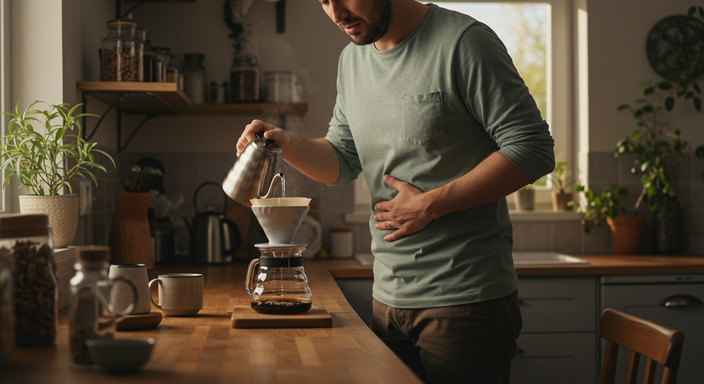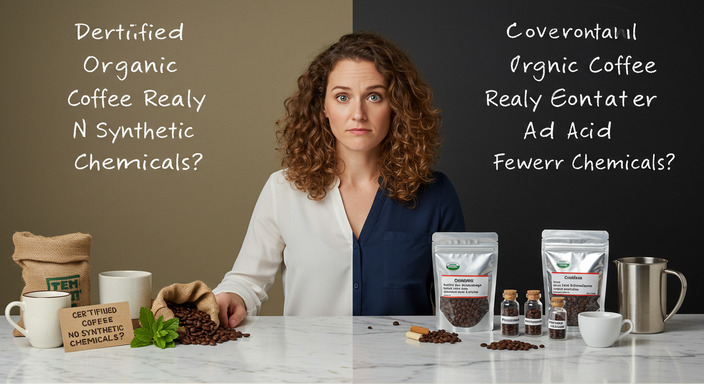
Can Organic Coffee Reduce Anxiety? Exploring the Benefits

Table of Contents
ToggleWhat Makes Coffee Organic?
Definition of Organic Coffee
Organic coffee is more than just a label—it’s a commitment to sustainable and ethical farming practices. At its core, organic coffee is grown without the use of synthetic pesticides, herbicides, or chemical fertilizers. Instead, farmers rely on natural methods like composting, crop rotation, and shade-growing techniques to nurture the coffee plants. This approach not only protects the environment but also ensures that the coffee beans are free from harmful residues.
Key Differences Between Organic and Conventional Coffee
Understanding the differences between organic and conventional coffee can help you make a more informed choice. Here’s a quick comparison:
- Growing Practices: Organic coffee is cultivated using natural methods, while conventional coffee often relies on synthetic chemicals to boost yield and combat pests.
- Environmental Impact: Organic farming promotes biodiversity, soil health, and water conservation, whereas conventional practices can lead to deforestation and pollution.
- Health Considerations: Organic coffee is free from chemical residues, making it a cleaner option for your body.
The Certification Process and Its Importance
For coffee to be labeled as organic, it must meet strict standards set by certifying bodies like the USDA (United States Department of Agriculture). The certification process involves:
- Regular inspections of farms to ensure compliance with organic standards.
- Verification that no prohibited substances have been used for at least three years before harvest.
- Documentation of sustainable practices, from seed to cup.
This certification is crucial because it provides transparency and trust, allowing consumers to support farming practices that align with their values.
The Link Between Coffee and Anxiety
How Caffeine Affects the Brain
Caffeine, the primary stimulant in coffee, works by blocking adenosine receptors in the brain. Adenosine is a chemical that promotes relaxation and sleepiness. When caffeine takes its place, it leads to increased alertness and energy. However, this process also triggers the release of adrenaline, the “fight or flight” hormone, which can heighten feelings of anxiety in some individuals. For those sensitive to caffeine, even a small amount can lead to jitteriness, restlessness, or a racing heart.
Why Some People Feel Anxious After Drinking Coffee
Not everyone reacts to caffeine the same way. Genetics, tolerance levels, and even stress can influence how your body processes it. People with a lower tolerance or those already prone to anxiety may experience heightened symptoms after consuming coffee. Additionally, factors like the amount of caffeine, the time of day, and whether you drink it on an empty stomach can amplify these effects. For some, switching to decaf or reducing intake can make a significant difference.
The Role of Chemical Residues in Conventional Coffee
Conventional coffee is often grown using synthetic pesticides, herbicides, and fertilizers. These chemicals can leave residues on the beans, which may end up in your cup. Some studies suggest that these residues could interact with your body in ways that exacerbate anxiety or other health issues. For example, certain pesticides are known to affect the nervous system, potentially amplifying the stimulating effects of caffeine. Choosing organic coffee, which is grown without these harmful chemicals, can reduce your exposure and support a healthier, more balanced experience.
Can Organic Coffee Reduce Anxiety?
Lower Exposure to Pesticides and Chemicals
One of the most compelling reasons to choose organic coffee is its lower exposure to pesticides and synthetic chemicals. Conventional coffee farming often relies on these substances, which can leave residues on the beans. When consumed, these residues may contribute to stress and anxiety by disrupting the body’s natural balance. Organic coffee, on the other hand, is grown without synthetic pesticides, herbicides, or fertilizers, offering a cleaner, more natural option. By reducing your intake of these chemicals, you may support your body’s ability to manage stress more effectively.
The Impact of Antioxidants on Mental Health
Organic coffee is rich in antioxidants, which play a crucial role in protecting the body from oxidative stress—a factor linked to anxiety and other mental health concerns. Antioxidants like chlorogenic acid, found abundantly in coffee, help combat free radicals and support brain health. Studies suggest that a diet high in antioxidants can improve mood and reduce symptoms of anxiety. By choosing organic coffee, you’re not only enjoying a delicious beverage but also nourishing your mind with compounds that promote mental well-being.
Anecdotal Evidence and Scientific Studies
Many coffee drinkers report feeling calmer and more focused after switching to organic coffee. While anecdotal evidence is compelling, scientific research is also beginning to explore the connection. Some studies suggest that the absence of harmful chemicals and the presence of beneficial compounds in organic coffee may contribute to reduced anxiety levels. However, it’s important to note that individual responses can vary, and more research is needed to fully understand the relationship between organic coffee and mental health.
Conclusion
While organic coffee isn’t a cure-all for anxiety, its benefits—such as lower pesticide exposure and high antioxidant content—make it a healthier choice for both your body and mind. By opting for organic, you’re not only supporting your mental well-being but also making a sustainable and ethical choice that benefits the planet. Whether you’re a coffee enthusiast or just starting to explore healthier options, organic coffee is a simple yet impactful way to enhance your daily routine.
FAQ
- Does organic coffee contain caffeine? Yes, organic coffee contains caffeine, but the levels are similar to conventional coffee. The difference lies in how it’s grown and processed.
- Can organic coffee help with stress? While it’s not a direct treatment for stress, the absence of harmful chemicals and the presence of antioxidants may support overall mental health.
- Is organic coffee more expensive? Organic coffee can be slightly more expensive due to sustainable farming practices, but many find the health and environmental benefits worth the investment.
Health Benefits of Organic Coffee
Rich in Antioxidants and Nutrients
Organic coffee is a powerhouse of antioxidants, which help combat oxidative stress and reduce inflammation in your body. Unlike conventionally grown coffee, organic coffee is free from synthetic pesticides and fertilizers, ensuring that these beneficial compounds remain intact. Antioxidants like chlorogenic acid not only fight free radicals but also support heart health and may even help regulate blood sugar levels. Additionally, organic coffee is packed with essential nutrients such as:
- Magnesium – supports muscle and nerve function
- Potassium – aids in maintaining healthy blood pressure
- B vitamins – boost energy and metabolism
Supports Gut Health and Overall Well-Being
Your gut is often called your “second brain,” and organic coffee can play a role in keeping it healthy. The natural compounds in organic coffee stimulate the production of stomach acid, which aids in digestion. Additionally, organic coffee’s purity means it’s less likely to irritate your gut compared to non-organic varieties that may contain chemical residues. A healthy gut contributes to improved immunity, better mood, and enhanced overall well-being.
Why Organic Coffee is a Healthier Choice
Choosing organic coffee isn’t just about what it contains—it’s also about what it doesn’t contain. Organic coffee is grown without synthetic chemicals, making it a cleaner, safer option for your body. Here’s why it stands out:
- Free from harmful pesticides – reduces the risk of chemical exposure
- Sustainably grown – supports healthier ecosystems and soil quality
- Ethical sourcing – often supports fair trade practices, benefiting farmers and their communities
By choosing organic coffee, you’re not only prioritizing your health but also making a conscious, eco-friendly decision that benefits the planet.
FAQ
Does organic coffee taste better? Many people find that organic coffee has a richer, more authentic flavor because it’s grown in nutrient-rich soil without artificial additives. Is organic coffee better for anxiety? Organic coffee’s lack of chemical residues and its nutrient-rich profile may help reduce anxiety for some individuals, though moderation is key. Is organic coffee worth the cost? Absolutely! The health benefits, environmental impact, and ethical considerations make it a worthwhile investment in your well-being and the planet.
The Environmental and Ethical Impact
How Organic Farming Protects the Planet
Organic coffee farming is a sustainable practice that prioritizes the health of the environment. Unlike conventional methods, organic farming avoids synthetic pesticides and fertilizers, which can harm soil quality, water sources, and local wildlife. Instead, it relies on natural processes like composting, crop rotation, and shade-grown techniques. These methods not only preserve biodiversity but also reduce carbon emissions, making organic coffee a planet-friendly choice.
Fair Trade and Ethical Sourcing Practices
When you choose organic coffee, you’re often supporting fair trade and ethical sourcing practices. Fair trade ensures that farmers receive fair wages and work in safe conditions, while ethical sourcing focuses on transparency and sustainability throughout the supply chain. These practices help combat exploitation and promote social justice in coffee-growing communities. By opting for certified organic and fair trade coffee, you’re contributing to a more equitable global economy.
Why Choosing Organic Supports Farmers and Communities
Organic farming isn’t just good for the earth—it’s also beneficial for the people who grow your coffee. By avoiding harmful chemicals, farmers protect their health and the health of their families. Additionally, organic farming often involves community-based initiatives that empower local growers and foster economic stability. When you buy organic coffee, you’re investing in the well-being of these communities, helping them thrive while preserving their traditions and way of life.
How to Incorporate Organic Coffee into Your Routine
Tips for Choosing the Best Organic Coffee Brands
When selecting organic coffee, it’s essential to prioritize quality, sustainability, and ethical sourcing. Look for certifications like USDA Organic, Fair Trade, or Rainforest Alliance to ensure the coffee meets strict environmental and social standards. Additionally:
- Opt for brands that clearly state their sourcing practices—transparency is key.
- Consider the roast level; lighter roasts often retain more antioxidants, which can benefit your health.
- Explore single-origin coffees for unique flavors and to support specific farming communities.
Brewing Methods That Maximize Benefits
The way you brew your coffee can significantly impact its flavor and health benefits. Here are a few methods to consider:
- French Press: Retains the natural oils, providing a richer flavor and potentially higher antioxidant content.
- Pour-Over: Offers precise control over brewing time and temperature, resulting in a clean and crisp cup.
- Cold Brew: A less acidic option that’s gentler on the stomach and perfect for warm weather.
Experiment with different methods to find what suits your taste and lifestyle best.
Balancing Coffee Consumption for Mental Well-Being
While organic coffee can be a great addition to your routine, moderation is key to maintaining mental well-being. Here’s how to strike the right balance:
- Limit intake: Stick to 1–3 cups per day to avoid overstimulation and maintain steady energy levels.
- Time it right: Avoid consuming coffee late in the day to prevent disruptions to your sleep cycle.
- Pair with mindfulness: Use your coffee break as a moment to pause, reflect, and enjoy the ritual.
By being mindful of your consumption habits, you can enjoy the benefits of organic coffee without compromising your mental health.
Final Thoughts: Is Organic Coffee Worth It?
Recap of Benefits for Anxiety and Health
Organic coffee offers a range of benefits that can positively impact both your mental and physical well-being. By avoiding synthetic pesticides and chemicals, it reduces your exposure to harmful substances that could exacerbate anxiety or other health issues. Additionally, organic coffee is often richer in antioxidants, which can help combat stress and inflammation. For those sensitive to caffeine, the cleaner, more natural profile of organic coffee may provide a smoother, less jittery experience. Choosing organic coffee isn’t just about taste—it’s about nurturing your body and mind.
Encouragement to Try Organic Coffee Mindfully
If you’re curious about organic coffee, there’s no better time to give it a try. Start by incorporating it into your routine mindfully. Pay attention to how it makes you feel—does it leave you more energized without the crash? Does it help you feel calmer or more focused? Remember, moderation is key. Even the healthiest coffee can have downsides if consumed in excess. Take the time to savor each cup, and let it become a moment of self-care in your day.
The Bigger Picture: Sustainability and Conscious Consumption
Beyond personal health, choosing organic coffee supports a larger movement toward sustainability and ethical consumption. Organic farming practices protect the environment by reducing soil erosion, conserving water, and promoting biodiversity. They also ensure fairer wages and safer working conditions for farmers. When you buy organic coffee, you’re not just investing in your health—you’re contributing to a healthier planet and a more equitable global community.
In the end, the decision to switch to organic coffee is a personal one, but it’s one that carries far-reaching benefits. Whether you’re motivated by health, environmental concerns, or simply a love for great coffee, making the switch is a small step that can lead to big changes. So, why not brew a cup of organic coffee today and see how it fits into your life?
FAQ
- Is organic coffee really better for anxiety? While individual experiences vary, organic coffee’s lack of synthetic chemicals and higher antioxidant content may contribute to a calmer, more balanced experience for some people.
- How can I ensure my coffee is truly organic? Look for certifications like USDA Organic or Fair Trade on the packaging, which guarantee the coffee meets strict organic and ethical standards.
- Does organic coffee taste different? Many people find that organic coffee has a cleaner, more nuanced flavor profile due to the absence of chemical residues and the use of high-quality farming practices.
is a writer and editor at Coffee With Finance, blending her love for coffee, personal finance, and visual storytelling. She crafts engaging articles, curates site images, and shares brewing tips, bean origins, and practical money advice. Anna believes that managing finances, like making great coffee, should be intentional and rewarding — bringing clarity, warmth, and beauty to every story she tells.




























Post Comment